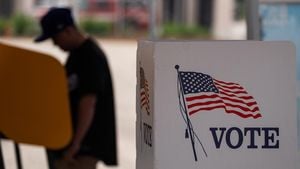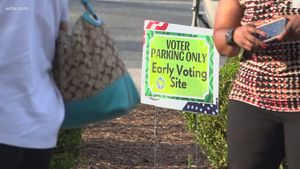Anxiety and Election Day: Finding Peace Amidst the Chaos
On November 5, 2024, as Americans head to the polls, many are feeling the weight of the moment. Heightened anxiety surrounding elections has become more prevalent as stakes rise higher than ever. The 2024 presidential election is no exception, where possibilities of delays and uncertainty make the emotional tumult even more palpable. A recent survey by the American Psychological Association revealed alarming statistics, showing 69% of American adults regard the election as a significant stressor, with 77% of individuals fretting over the nation’s future. Anxiety levels are at their peak, making it imperative to find effective coping strategies.
This year's anxiety isn't just about the wait to know who fills the top political office but also about broader issues facing the country. From concerns about democracy to the effects of social media on public discourse, people are understandably on edge. Fortunately, experts have stepped forward to share tips to help individuals navigate this ardent time.
Dr. Allison Asharch, psychologist at the University of Maryland’s Counseling Center, emphasizes the power of personal agency during these trying times. "Exercising your right to vote is such an important way to know you’ve done what you can to influence the situation," she notes. Having a plan to cast your vote can not only empower individuals, but it might also quell some of the anxiety surrounding the event.
Similarly, creating structured routines can provide comfort. Whether it’s attending classes, grocery shopping, or gathering with friends to watch results come in, maintaining regularity can help diminish those tense feelings of waiting. According to Asharch, such elements of routine make it easier to shift focus away from the uncertainty surrounding election results. Meditation and walking serve as grounding techniques to engage the mind away from potentially unsettling news cycles.
The constant stream of information can exacerbate worries, so it’s wise to consume media consciously. Asharch advises crafting an intentional media consumption plan—perhaps checking updates on reliable news platforms instead of endlessly scrolling through social media. This proactive approach can prevent the anxiety-laden chaos associated with perpetual alertness.
The forthcoming days call for practical action and self-care strategies. Experts recommend the age-old tactic of distraction. Engaging with hobbies—such as cooking or crafting—can offer healthy breaks from the whirlwind of election updates. One tantalizing option is trying out complicated recipes such as homemade orecchiette topped with mini-meatballs, which not only serves as a delicious meal but can usher individuals away from their screens.
While some might find solace through meditation, others may feel the urge toward traditional comfort mechanisms: spending time with friends or indulging themselves with their favorite shows. Madeline Walker, 27, plans to navigate Election Day with friends. After voting, they’ll indulge together with takeout and wine, firming up supportive bonds between them, regardless of the incoming news. Walker explains, “I think we aren’t going to know anything tomorrow night, but we will watch as long as we can.” Embracing community makes even the darkest moments feel lighter.
And then there’s the great outdoors. Experts suggest time outside and movement can relieve stress. A brisk walk or bike ride can boost serotonin levels, naturally alleviating anxiety. So why not squeeze it all together: grab some fresh air, come back, and whip up something delicious?
After taking these constructive actions, the next challenge may be dealing with any fallout post-election. Recognizing the reality of stress as it lingers beyond Election Day is important. Establishing post-election plans for maintaining well-being can help. Whether through setting aside relaxing activities or planning gatherings with friends, these techniques can turn feelings of uncertainty to days filled with intention.
It’s also important to seek help when needed. The increasing levels of anxiety post-election could linger for longer than expected. If feelings of distress continue for more than two weeks, reaching out to mental health professionals is encouraged. Hotlines, like Colorado’s crisis line, provide support and can help individuals tap back to ease without feeling burdened.
The ebb and flow of electoral politics can take its toll. Managing one’s mental health during these times is not only prudent but necessary. By recognizing the signs of anxiety and taking actionable steps for relief, voters can find peace among the turbulence. Whether it's immersing oneself deeply in cooking or spending time with loved ones, there are myriad ways for people to focus on what matters—taking care of ourselves and each other.
So as the ballots are cast and counted, keep this thought close: we can be active participants in our democracy, and at the same time, we can carve out space for self-care amid the chaos. Every little step counts, both for the world at large and for our own well-being.



